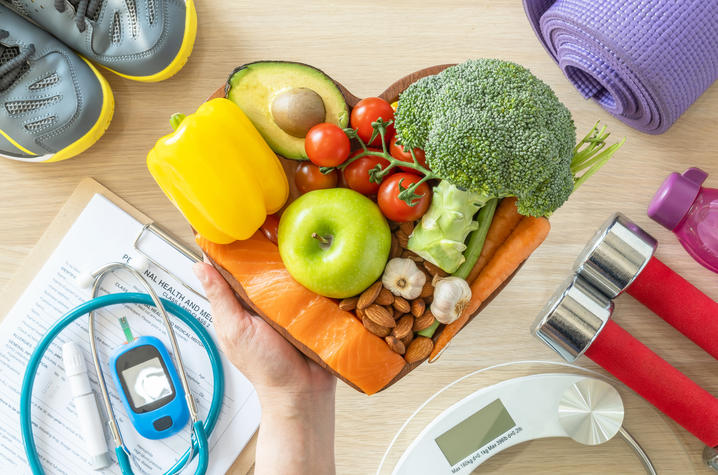Making smart food choices to reduce cancer risk

The University of Kentucky Public Relations and Strategic Communications Office provides a weekly health column available for use and reprint by news media. This week’s column is by Rachel C. Miller, a registered dietitian at the University of Kentucky Markey Cancer Center.
LEXINGTON, Ky. (Feb. 3, 2025) – As we begin the new year, many people might be thinking about improving their diet and overall health. As an oncology dietitian at UK Markey Cancer Center, I’m often asked about the connection between diet and cancer prevention. While there’s a lot of conflicting nutrition information online, the evidence-based answer that a diet rich in plant-based foods can help reduce your cancer risk.
A plant-based diet doesn’t mean you have to become vegetarian or give up all animal products. It means making fruits, vegetables, whole grains, beans and other plant foods the focus of your meals, while treating meat and dairy as supporting players.
Here’s what you need to know about eating for cancer prevention:
- Plant foods are powerful cancer fighters. They contain natural compounds called phytochemicals and antioxidants that work together to keep our cells healthy and protect them from damage. Colorful fruits and vegetables are especially rich in these protective compounds.
- A plant-based diet helps maintain a healthy weight. Excess body weight increases risk for several types of cancer, and plant foods are naturally low in calories and high in fiber while being filling and satisfying.
- You don’t have to give up meat entirely. This approach is flexible – you can still enjoy lean proteins like chicken, fish, eggs and low-fat dairy. The key is to fill most of your plate with plant foods first.
The most important thing to remember is that you don’t have to make perfect choices all the time. Even small improvements to your diet can help reduce your cancer risk over time. Here are some simple, small changes that can make a difference:
- Add an extra serving of vegetables to your lunch and dinner.
- Choose whole grain bread and pasta instead of white.
- Include beans or lentils in your meals a few times a week.
- Keep fresh fruit visible on your counter for easy snacking.
- Try meatless meals once or twice a week.
For more science-based information about eating for cancer prevention, visit the American Institute for Cancer Research website at aicr.org. Their site offers free recipes, meal planning tips and the latest research on diet and cancer prevention.
UK HealthCare is the hospitals and clinics of the University of Kentucky. But it is so much more. It is more than 10,000 dedicated health care professionals committed to providing advanced subspecialty care for the most critically injured and ill patients from the Commonwealth and beyond. It also is the home of the state’s only National Cancer Institute (NCI)-designated Comprehensive Cancer Center, a Level IV Neonatal Intensive Care Unit that cares for the tiniest and sickest newborns and the region’s only Level 1 trauma center.
As an academic research institution, we are continuously pursuing the next generation of cures, treatments, protocols and policies. Our discoveries have the potential to change what’s medically possible within our lifetimes. Our educators and thought leaders are transforming the health care landscape as our six health professions colleges teach the next generation of doctors, nurses, pharmacists and other health care professionals, spreading the highest standards of care. UK HealthCare is the power of advanced medicine committed to creating a healthier Kentucky, now and for generations to come.




